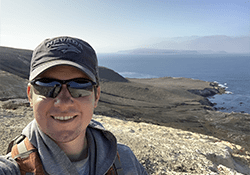Assistant Professor

Contact Info
Institution: University of Nevada, Reno
Phone: (775) 682-7623
Address: 1664 N. Virginia St. MS0096, Reno, Nevada 89557, US
Website: https://www.unr.edu/anthropology/faculty/christopher-jazwa
Research Disciplines
Archeology
Paleoecology
Behavioral Ecology
Stable Isotope Ecology
Research Interests
Island and Coastal Archaeology, California Archaeology, Radiocarbon Dating, Isotope Geochemistry, Human Behavioral Ecology, Past Environments, Settlement Patterns
Projects
Archeological Inventory and Condition Assessments at Channel Islands National Park to Address Vulnerabilities
Biography
Christopher Jazwa is broadly interested in how patterns of human settlement, subsistence and mobility are influenced by the changing environment and cultural factors that mediate human-environmental dynamics. In particular, much of his work focuses on how the distribution and availability of environmental resources, along with cultural factors that affect how people use those resources, influence the distribution of human settlement. Jazwa has three active research projects on California’s Channel Islands; Cabo Pulmo, Mexico; and the Loukkos Valley, Morocco. He is co-director (with Christopher Morgan) of the Human Paleoecology and Archaeometry Laboratory at the University of Nevada, Reno.
His work on California's Channel Islands has been ongoing since 2004. There, he uses ecological models to understand the establishment, expansion and contraction of human settlement on the islands through time. Jazwa's current work involves the use of stable isotopic signatures to reconstruct environmental change on both long-term (climate change) and short-term (ENSO, inter-annual variation, seasonality) scales and the effects on patterns of human mobility.
His work in Cabo Pulmo began in 2018 and is focused on understanding human interactions with the coastal environment in a relatively understudied area. He is working on determining the distribution of archaeological sites and understanding the chronology of human occupation in the region.
Jazwa also is interested in applying human behavioral ecology models to the classical world. Since 2016, he has been a part of the Gardens of the Hesperides Project in the Loukkos River Valley, Morocco, under the direction of Stephen Collins-Elliot of the University of Tennessee. In this project, he is using the Ideal Free Distribution model to trace changes in settlement patterns outside of the primary site of Lixus.
Education
- Ph.D., Pennsylvania State University, 2015, Anthropology (Archaeology Specialization). Dissertation: A Dynamic Ecological Model for Human Settlement on California’s Northern Channel Islands. (Research Advisor: Douglas Kennett).
- M.S., University of Rhode Island, 2009, Oceanography (Marine Geology and Geophysics Specialization). Master’s Thesis: Mapping the Submerged Landscape of Norfolk Canyon, VA Using Acoustic Techniques and the Search for Submerged Prehistoric Archaeological Sites. (Research Advisor: Robert Ballard).
- M.A., University of Rhode Island, 2008, History (Anthropology and Archaeology Specialization). Master’s Thesis: Investigations of a Potential Prehistoric Archaeological Site in Ninigret Pond, RI and the Implications for the Understanding of Native American Land Use Along the Southern Rhode Island Coast. (Research Advisor: Rod Mather).
- B.S., Harvey Mudd College, 2005, Physics and Anthropology.